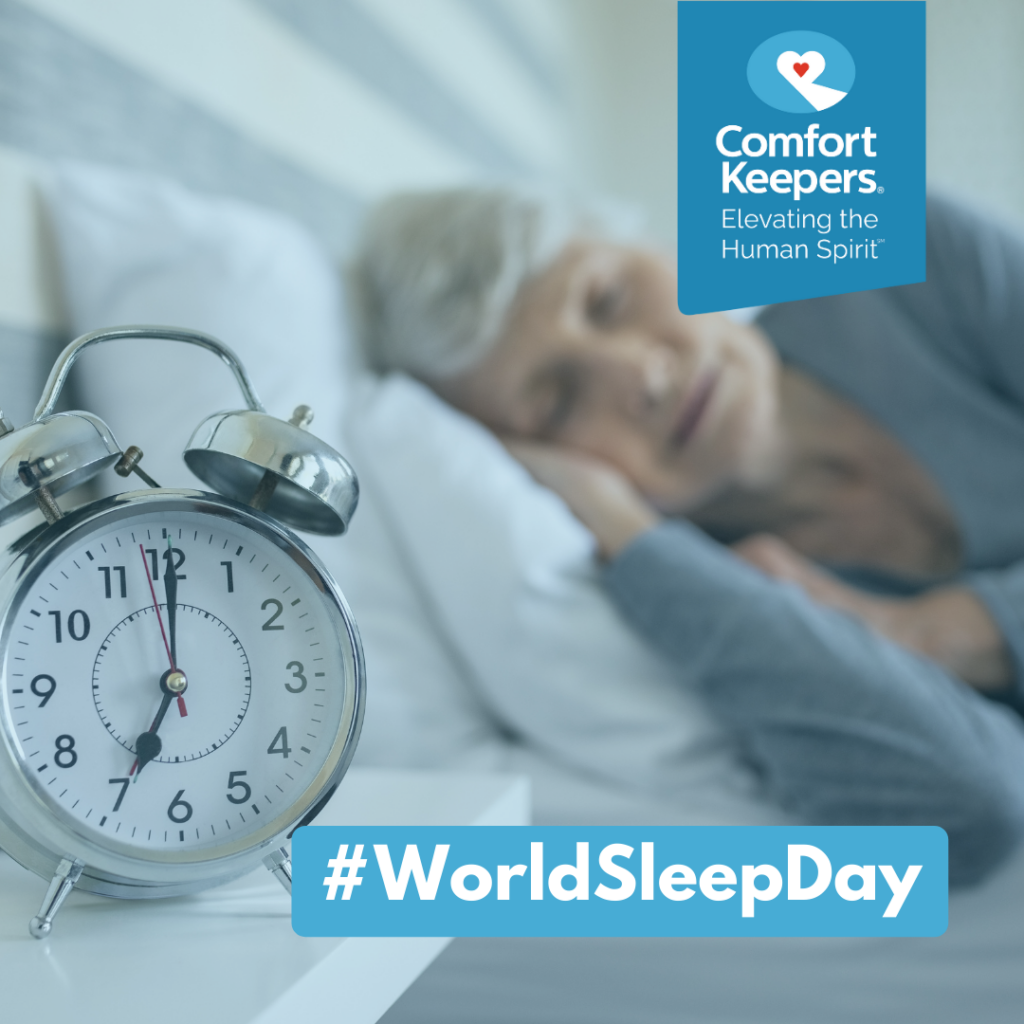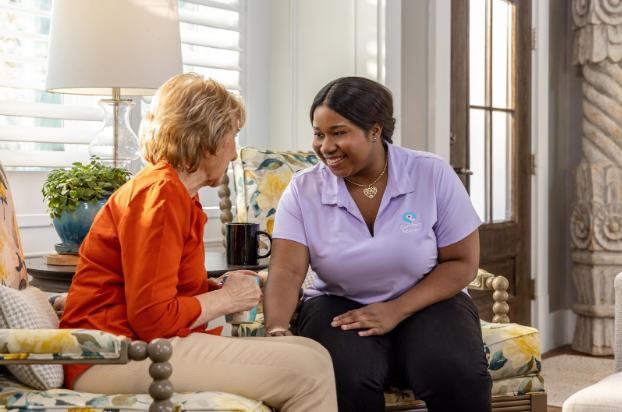Solving Sleep Problems in Seniors
Senior Health and Wellbeing | March 15, 2022

What Every Senior in Edmonton, AB, Needs to Know About Senior Sleep Problems
Solving Sleep Problems in Seniors | It is a common misconception that sleep needs decline with age. Older adults need the same amount of sleep as younger adults: 7 to 9 hours each night.
Changes in sleep patterns, or what specialists call “sleep architecture”, can occur as we age, and this may contribute to sleep problems. There are two kinds of sleep: REM (rapid eye movement) and non-REM sleep. We dream mostly during REM sleep and have the deepest sleep during non-REM sleep. The sleep cycle is repeated several times during the night, and although total sleep time tends to remain constant, older people can spend more time in the lighter stages of sleep than in deep sleep.
Fast Facts
44% of older persons experience one or more of the nighttime symptoms of insomnia
at least a few nights per week.
Other factors affecting sleep are the circadian rhythms that coordinate the timing of our bodily functions, including sleep ─ and seniors tend to become sleepier in the early evening and wake earlier in the morning, as compared to younger adults. This pattern is called “advanced sleep phase syndrome”.
Solving Sleep Problems in Seniors: What Causes Sleep Problems?
Several things can cause sleep problems. By the time an adult is over 65 years old, his or her sleep-wake cycle may not work as well as it did when he or she was younger. As we age, the body makes less growth hormone and melatonin, the chemicals and hormones that help us sleep well. Some lifestyle habits, such as smoking and drinking alcohol or caffeinated drinks, can cause sleep problems, as can illness, pain, or medications.
Additional sleep problems in seniors causes can include:
Insomnia:
The most common sleep problem in adults aged 60 and older. People with insomnia have trouble falling asleep and staying asleep.
Sleep apnea:
Frequent, short pauses in breathing while sleeping. If not treated, sleep apnea can lead to other problems such as high blood pressure, stroke, or memory loss.
Movement disorders:
Such as restless legs syndrome (RLS), a condition in which legs feel very uncomfortable when you are sitting or lying down; and periodic limb movement disorder (PLMD), a condition in which a person kicks one or both legs many times during sleep. Medications may help.
Alzheimer’s disease:
Can cause some seniors to sleep too much, while others don’t sleep enough. Some people wake up many times during the night; others wander or become agitated. Safety precautions around the home need to be addressed for seniors with Alzheimer’s.
Other health factors include gastroesophageal reflux disease (GERD), diabetes mellitus, renal failure, respiratory diseases such as asthma, and immune disorders. Parkinson’s disease and multiple sclerosis (MS) also can cause problems sleeping.
Solving Sleep Problems in Seniors: Tips on How to Improve Sleep
No matter the reason, without a good night’s sleep, the next day, a senior can be tired and irritable, unable to perform tasks, have memory problems or be forgetful, feel depressed, and be at risk for more falls or accidents. Here are some preventative tips that you can give to your loved one.
Tip #1 – Talk with your doctor:
Ask your doctor for help if pain or other health problems are keeping you awake. Ask if any medicines could be keeping you awake at night. Medicines that can disrupt sleep include antidepressants, beta-blockers, and cardiovascular drugs.
Tip #2 – Limit the use of sleep aids and sleeping pills:
Many sleep aids have side effects and are not for long-term use; sleeping pills don’t address the causes of insomnia and can make it worse in the long run.
Tip #3 – What to do at night:
- Establish a regular, relaxing bedtime routine. Read, take a bath, or listen to soft music before bed.
- Maintain a regular bed and wake time schedule, and avoid napping in the late afternoon or evening.
- Create a sleep-conducive environment that is dark, quiet, comfortable, and cool.
- Sleep on a comfortable, supportive mattress and pillows, and with suitable blankets.
- Finish eating at least 2-3 hours before bed, and avoid nicotine, alcohol, and caffeine.
- Naturally, boosts melatonin levels. Artificial lights at night can suppress the production of melatonin. Use low-wattage bulbs where you can. Turn off the TV and computer at least one hour before bed.
Tip #4 – What to do during the day:
- Engage with others and perform daily tasks to help prepare the body for a good night’s sleep.
- Improve your mood. A more positive mood and outlook can reduce sleep problems.
- Exercise at regular times each day with physician approval, but not within 3 hours of your bedtime, to release endorphins that can boost mood and reduce stress, depression, and anxiety.
- Get out in the sunlight each day. Bright sunlight helps regulate melatonin and sleep-wake cycles.
Comfort Keepers® Edmonton is Proud to Offer a Wide Range of Home Senior Care Services
Our trained caregivers will ensure your loved one is comfortable, independent and safe in their home. On top of that, we will also aim to enhance their overall health, quality of life and general happiness.
Top-Notch Home Healthcare for Seniors in Edmonton, Alberta
Comfort Keepers of Edmonton offers a wider range of senior care services. We offer retirement care, respite care, senior care, companionship care, end-of-life care, post-surgery care, palliative care, personal care, and senior living transition services. If you are concerned about the health and well-being of your aging loved ones we can help with 24-hour care and more!
Helping Seniors Age-in-Place with Companionship Care and Interactive Caregiving™
Empathetic care starts in the heart and allows us to meet our client’s needs. Our trained caregivers are selected with one specific quality in mind, empathy. We strive to stimulate our clients emotionally, mentally and socially, thus enhancing their overall quality of life.
Our Interactive Caregiving™ provides a system of care that addresses companionship, safety, nutrition, mind, body, and activities of daily living (ADLs). The system increases seniors’ sense of well-being, independence and companionship by focusing on Senior Mind, Senior Body, Senior Nutrition, and Senior Safety.
Affordable and Client-Directed Homecare is Available for Qualifying Albertans
Comfort Keepers® Edmonton is an Approved Service Provider for the Client Directed Homecare Invoicing (CDHCI) Program Offered by Alberta Health Services.
What is the Client Directed Home Care Invoicing Program (CDHCI)?
CDHCI is a great program provided by Alberta Health Services (AHS), allowing clients to choose an approved agency like, Comfort Keepers Edmonton for Personal Care, Respite Care and Homemaking needs. The chosen agency can then bill AHS directly for services rendered for approved hours through Alberta Blue Cross. Read more about the program HERE.
Accredited Home Care Edmonton
Comfort Keepers® Edmonton was awarded the “Accredited with Exemplary Standing” seal by Accreditation Canada. This honour demonstrates Comfort Keepers’ commitment to offering safe, high-quality home care to its senior clients in Edmonton, AB.
To learn more about senior in-home care in Edmonton, contact the Comfort Keepers® office. Our service territory includes Edmonton, Devon, Sherwood Park, Stony Plain and surrounding areas, contact the Comfort Keepers Edmonton office at 780-465-4665.
References:
National Institute on Aging (NIH). “A Good Night’s Sleep”. Web. 2015
FamilyDoctor.org. “Sleep Changes in Older Adults”. Web. 2012.
HealthGuide.org. “How to Sleep Well as You Age”. Web. 2016.
National Sleep Foundation. “Aging and Sleep”. Web. 2016.
Individualized Home Care Options
Long-Term Home Care, 24 Hour Home Care & Short Term Care Options Customized for You







